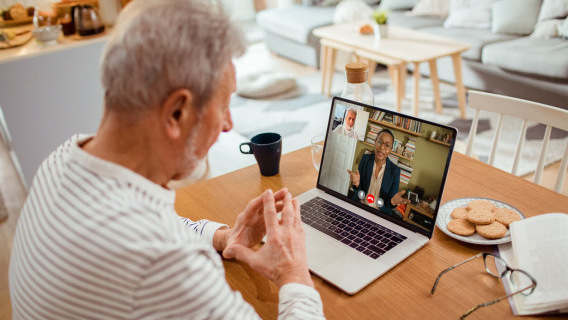Top Tips for Virtual Therapy for Mesothelioma

As a mesothelioma support group facilitator and an oncology psychotherapist for more than 25 years, I’ve helped many patients and caregivers find therapists. They’ve sought help with anxiety, depression and relationship problems that can accompany a cancer diagnosis.
It’s important to find a therapist with expertise in psychosocial oncology. Most people don’t want to have to teach their therapist about the basics of mesothelioma care. But not every therapist has expertise in mental healthcare for mesothelioma patients, so it can be a challenge to find the right fit for you.
It may be a challenge to find a psycho-therapist in your community with openings and who takes your insurance. Opening your options to virtual psychotherapy and casting a wider net beyond driving distances increases the likelihood of finding a therapist who works with cancer patients.
5 Key Benefits of Virtual Therapy for Mesothelioma
There are benefits and challenges to the virtual therapy modality. It’s important to discuss some of the considerations for those dealing with a mesothelioma diagnosis as they may benefit more than others from virtual psychotherapy.
When the COVID pandemic began, medical and mental health care providers pivoted to offer care via telehealth. Currently, some psychotherapists offer both in person and virtual therapy, while other therapists switched to providing virtual therapy only.
3 Tips to Find Therapists With Cancer Expertise
Because mesothelioma is extremely rare, it can be challenging to find one with mesothelioma-specific experience. But a therapist with expertise in psycho-oncology will be very well equipped to work with mesothelioma patients and their caregivers.
Some treatment centers are incorporating psycho-oncology into their comprehensive treatment offerings. But if your center doesn’t yet, or you travel for treatments and are looking for a virtual option, speak with your doctor, patient advocate or try one of the tips that follow.
- Ask Treatment Center Staff: Ask the staff at your mesothelioma treatment center if they recommend any therapists who specialize in working with cancer patients.
- Check In Network Lists: If you have mental health coverage with your health insurance, you can get a list of providers from your insurance company.
- Use Online Resources: Sites that list active practitioners (Psychology Today-Find a Therapist, Good therapy.org. etc) and therapists’ own websites can also be helpful in seeing who does virtual therapy and if they have expertise with cancer patients.
Online practitioner reviews from fellow patients can be incredibly helpful to check out after using any or all of the tips for finding a therapist. They’re an opportunity to get perspective about their approach and offerings.
The American Psychosocial Oncology Society may be able to share insights into which members offer virtual services. Contacting APOS can also be an opportunity to learn more about psycho-oncology.
5 Tips for Getting the Most Out of Virtual Sessions
Most insurance companies and therapists require that sessions be synchronous – in real time – and that communication is both audio and video. So, you’ll need to be prepared technologically and have a private space appropriate for your session.
- Have a computer, smartphone or tablet ready with both a microphone and a video camera.
- Be sure your internet connection is strong to support real-time audio and video communication.
- If your Wi-Fi is spotty, consider plugging in directly to your router to minimize lag or dropped signals.
- Ensure you have privacy during your counseling session.
- If total privacy isn’t possible, wear earbuds or headphones with a microphone to enable you to communicate at a lower volume and prevent others from hearing what your therapist is saying.
Confidentiality and privacy are very important to feel safe communicating about how you’re feeling in therapy. It’s also important to note that it’s not safe for therapy sessions to occur while anyone is driving or a passenger in a car.
Virtual psychotherapy has gained popularity in recent years, enabling people with serious illnesses to see a therapist when they aren’t feeling well enough to go into an office. It also opens the door to finding the right therapist for mesothelioma survivors or caregivers when there isn’t a therapist with cancer expertise practicing nearby.